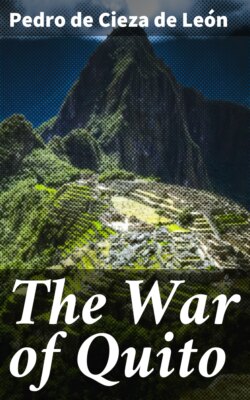Читать книгу The War of Quito - Pedro de Cieza de León - Страница 29
На сайте Литреса книга снята с продажи.
CHAPTER XXIII
ОглавлениеTable of Contents
How, when Gonzalo Pizarro was feeling very sad because the citizens of Cuzco did not agree with him as he expected, there arrived Mezcua who had gone to spy with letters from several people, and what else happened.
The Captain Gonzalo Pizarro, on his arrival at the city of Cuzco, notwithstanding that Alonso de Toro, Villacastin, and Tomas Vasquez showed great willingness and declared themselves to be his faithful friends, had found a strong disinclination to comply with his wishes among the others. The reason was that they knew of the arrival of the Viceroy in Lima, and they felt that it would not be right to oppose themselves to the royal orders. Seeing this, Pizarro was discouraged and somewhat enraged. He had been wrong and wanting in knowledge to be moved by private letters and conversations. He ordered his Indians to depart from Cuzco which they had done, and he was about to do the same when Gomez de Mezcua arrived. He had set out from Cuzco, by Pizarro’s order, to find out what was happening at Lima. He met Gaspar Rodriguez de Camporedondo and Bachicao, with others, at Guamanga. These used very ugly words against the Viceroy and the ordinances. When they heard from Mezcua that Gonzalo Pizarro was in Cuzco, they rejoiced exceedingly, telling him to return and report that they were coming. They gave him letters from some of the citizens of Lima who spoke of their hatred of the Viceroy. Pizarro was urged to drive him out of the country if he would not suspend the ordinances until his Majesty the King was informed of the grave injury they would do. Mezcua with great speed returned to Cuzco to bring such joyful news, just at the time when Gonzalo Pizarro was preparing to leave it.
When the coming of the citizens and the things they said of the Viceroy were known, opinions in Cuzco altered a good deal. Men declared that they would not suffer such injuries. Pizarro, sending for Alonso de Toro, Villacastin and his other friends, showed them letters he had received from Lima, and told Mezcua to state what he had been told by Gaspar Rodriguez and his companions. The news made Gonzalo Pizarro change his mind about returning to Charcas, and gave the citizens of Cuzco a reason for electing him as Procurator-General to prevent the new laws from being enforced until his Majesty had received and considered the petitions of the conquerors of Peru.
Here the reader may see how fragile and slippery are the affairs of this world, and that there are many changes in every hour that we live in it. At one moment we find Gonzalo Pizarro about to retire into private life, and the people of Cuzco in no mind to make him their Procurator, nor to give him any other charge. In another, no sooner was it known that citizens of Lima were coming to arouse those of Cuzco, than Pizarro was accepted to take command over all others, march to Lima, and drive out the Viceroy. Afterwards, by virtue of a clause in the will of the Marquis his brother, Gonzalo Pizarro was to be received as Governor. Pompey the Great, when Julius Cæsar passed the Rubicon, was received as Captain-General against him and, being in Greece, at the proposal of the Consul Lentulus he was given a commission to raise troops, appoint captains, and fit out fleets against him who was looked upon as an enemy. The simple people of all nations, when they saw the mandate of the Roman Senate, and that Pompey was appointed as Captain-General to defend the republic, easily came to the conclusion that Pompey was fighting solely for the public good, which, God knows, would be that he who conquered might do as he pleased.
Thus, in the kingdom of Peru the news spread that those of the municipality and the other citizens had nominated Gonzalo Pizarro as Procurator. Believing that his only object was their good, they rejoiced and gave assistance. He had more time than Pompey had to mature the tyrannical objects which he fostered in his bosom. Happy those who were in the kingdom, and were able to desist from following the banners of this tyrant. But what can I say, being far away in the dense cane brakes of Quimbaya[39], yet this fury extended even to that distance, letting us know how cruel are these civil wars.
